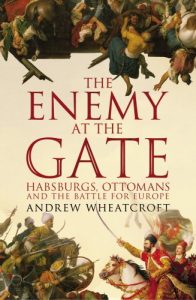In 1683, two empires - the Ottoman, based in Constantinople, and the Habsburg dynasty in Vienna - came face to face in the culmination of a 250-year power struggle: the Great Siege of Vienna.
Within the city walls the choice of resistance over surrender to the largest army ever assembled by the Turks created an all-or-nothing scenario: every last survivor would be enslaved or ruthlessly slaughtered. The Turks had set their sights on taking Vienna, the city they had long called 'The Golden Apple' since their first siege of the city in 1529. Both sides remained resolute, sustained by hatred of their age-old enemy, certain that their victory would be won by the grace of God.
Eastern invaders had always threatened the West: Huns, Mongols, Goths, Visigoths, Vandals and many others. The Western fears of the East were vivid and powerful and, in their new eyes, the Turks always appeared the sole aggressors. Andrew Wheatcroft's extraordinary book shows that this belief is a grievous oversimplification: during the 400 year struggle for domination, the West took the offensive just as often as the East.
As modern Turkey seeks to re-orient its relationship with Europe, a new generation of politicians is exploiting the residual fears and tensions between East and West to hamper this change. The Enemy at the Gate provides a timely and masterful account of this most complex and epic of conflicts.
Within the city walls the choice of resistance over surrender to the largest army ever assembled by the Turks created an all-or-nothing scenario: every last survivor would be enslaved or ruthlessly slaughtered. The Turks had set their sights on taking Vienna, the city they had long called 'The Golden Apple' since their first siege of the city in 1529. Both sides remained resolute, sustained by hatred of their age-old enemy, certain that their victory would be won by the grace of God.
Eastern invaders had always threatened the West: Huns, Mongols, Goths, Visigoths, Vandals and many others. The Western fears of the East were vivid and powerful and, in their new eyes, the Turks always appeared the sole aggressors. Andrew Wheatcroft's extraordinary book shows that this belief is a grievous oversimplification: during the 400 year struggle for domination, the West took the offensive just as often as the East.
As modern Turkey seeks to re-orient its relationship with Europe, a new generation of politicians is exploiting the residual fears and tensions between East and West to hamper this change. The Enemy at the Gate provides a timely and masterful account of this most complex and epic of conflicts.






